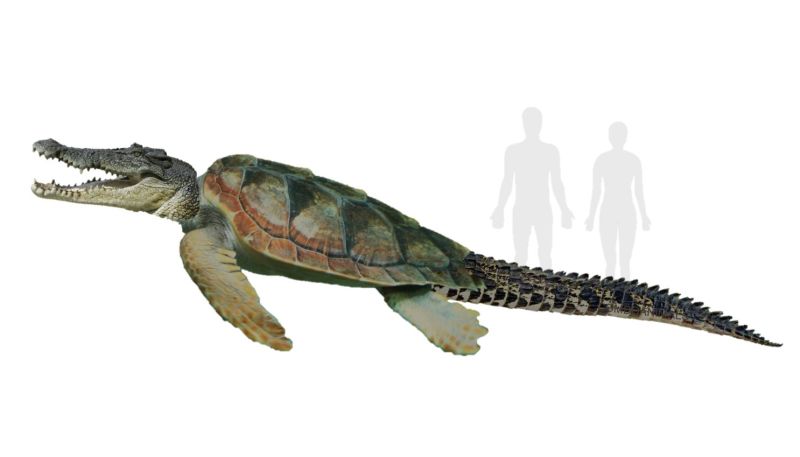Crocodile - Turtle

Nickname: Crocoturtle
Crocodile Power: Sharp Bite
Sea Turtle Power: Agile Swimmer
Comboanimals Fun bit of Information
Give a sea turtle the mass and bite power of a saltwater crocodile and it means it doesn’t have many natural predators giving it the freedom to swim at peace.
Comboanimals Folklore
The crocodile and the turtle are some of the oldest reptiles. Researchers concluded that turtles must have branched off from crocodiles around 210 million years ago.
Comboanimals Physical description
A turtle with the head, tail and mass of a crocodile.
It boasts the sturdy body and powerful jaws of a crocodile, complete with its scaly skin, muscular tail, and sharp teeth. However, atop its crocodilian body rests a distinctively turtle-like shell, providing it with an additional layer of armor and protection.
Male’s typically range from 3.5 to 5 m (11 ft 6 in – 16 ft 5 in) in length and weighs 200 to 1,100 kg (440 to 2,430 lb). On average, adult males range 4.0 to 4.5 m (13 ft 1 in – 14 ft 9 in) in length and weigh 408 to 770 kg (899 to 1,698 lb). Making them potentially 11 times bigger than the average adult human.
Comboanimals Information
Special abilities: hide in shell to protect itself, quick lunge and a powerful bite.
It is a very fast swimmer reaching speeds of 22mph with it’s big tail and four flippers. It is however slow on land and a very poor climber because it has to drag itself across the ground with its fins. Due its poor movement on land and it’s excellent speed in water it will stay predominately in water. It will only come onto land to rest, sun bathe on the shore and lay its eggs.
They are great hunters, able to use the speed of a turtle and it’s powerful tail and front flippers to outpace sea animals and catch them underwater. They can also use the hunting tactics of a crocodile to catch land animals by use of stealth and patience, lurking beneath the water's surface for extended periods, waiting for unsuspecting prey to come to the waters edge within striking distance.
They are particularly skilled at blending into their surroundings, often remaining motionless for extended periods, camouflaged against the muddy banks or submerged in the water, waiting for the perfect opportunity to strike.
The water bodies it inhabits are saltwater such as the ocean or stretches of rivers which join the sea. However, unlike crocodiles, Crocoturtles display a more docile demeanor, often opting to retreat into their shells when faced with significant potential threats, relying on their armored exterior for protection. Typically the only animals big enough to make it retreat into its shell are large cats, sharks and orcas.
The Crocoturtle's diet is that of opportunistic predators, they take advantage of their crocodile lineage to hunt and devour a variety of prey, including fish, amphibians, smaller reptiles, and even small mammals that venture too close to the water's edge.
Their habitats are usually warm, tropical regions where rivers meet the sea. These habitats offer an abundant supply of prey, as well as ample basking spots for the Crocoturtle to soak up the sun's warmth.
Location: South America
Ratings Reasoning: High adaptable rating due to its excellent hunting abilities and its lack of predators. Not many predators are fast enough to catch it or strong enough to piece its shell or handle its bite power.
Comboanimals Statistics
Type: monster
Animal Characteristics. (1 = Crocodile , 2 = Turtle)
Size = 1, Strength = 1, Speed = 1, Agility = 1, Attack = 1, Defence = 2, Intelligence = 1, Fly = 1, Swim = 1, Climb = 1.
Deadly Rating (out of 5): 3. Friendly Rating (out of 5): 1. Cool Rating (out of 20): 18. Adaptability Rating (out of 5): 5.